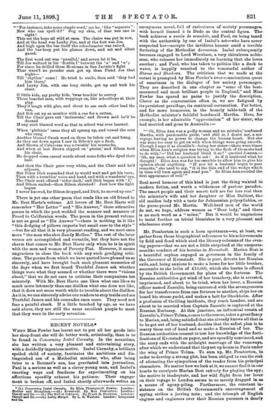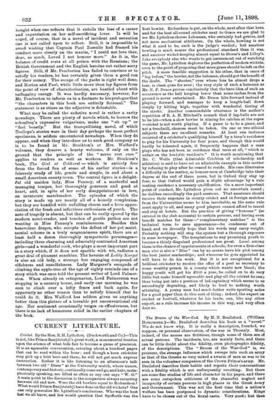RECENT NOVELS.*
WHEN Miss Fowler has learnt not to put all her goods into her shop-front she will do better work, artistically, than is to be found in Concerning Isabel Carnaby. In the meantime, she has written a very pleasant and entertaining story, with a decidedly ingenious motive. Isabel Carnaby, a brilliant spoiled child of society, fascinates the ambitious and dis- tinguished son of a Methodist minister, who, after being tutor to a Baronet's son, has gravitated inte journalism. Paul is a serious as well as a clever young man, and Isabel's exacting ways and fondness for experimenting on his affections speedily exhaust his patience. Their engage- ment is broken off, and Isabel shortly afterwards writes an • (1.1 Concerning Isabel Carnaby. By Ellen Thornyerott Fowler. London : Hodder and Stonghton.—(8 Kronstadt. By Max Pemberton. London, eamell and Co.-3.) The Girl at Cobhurst. By Frank R. Stockton. London: Owen and 0o.—(4.) Leddy Marget. By L. B. Wallord. London : Longo:tans and Co. anonymous novel, full of caricatures of society personages, with herself limned a /a Dodo as the central figure. The
book achieves a succes de scandale, and Paul, on being taxed with the authorship by one of Isabel's set—who have never suspected her—accepts the invidious honour amid a terrible flattering of the Methodist dovecotes. Isabel subsequently becomes engaged to Lord Wrexham, a very chivalrous noble- man, who releases her immediately on learning that she loves another ; and Paul, who has taken to politics like a duck to water, is happily reunited to the remorseful author of Shams and Shadows. The criticism that we made at the outset is prompted by Miss Fowler's over-conscientious quest of smartness in the dialogue of her society personages. They are described in one chapter as "some of the best- mannered and most brilliant people in England," and Miss Fowler has spared no pains to justify the description.
Clever as the conversation often is, we are fatigued by its persistent persiflage, its continual coruscation. Far better, and far more humorous, is the homely table-talk of the Methodist minister's faithful handmaid Martha. Here, for
example, is her admirable " appreciation " of her sister, who had married and gone to Australia :— " Oh, Eliza Ann was a godly woman and no mistake,' confessed Martha, with pardonable pride, and still is, I doubt not, a sea voyage having no power to change the human heart. But she was none too easy to get on with when things were going smooth. Though I says it as shouldn't—being her sister—there were times when Eliza Ann's religion was trying to the flesh of them she had to do with.'—' Did her husband think it so ? ' queried Joanna.— ' Oh, my dear, what a question to ask ! As if it mattered what he thought ! Eliza Ann was far too sensible to allow him to give his opinion about anything. "If you let a husband begin to pass remarks," she used to say, "it is the thin end of the wedge which in time will turn again and rend you." So Eliza Ann avoided the first appearance of evil.'"
Real novel humour of this kind is just the thing wanted in modern fiction, and worth a wilderness of parlour paradox. The smart people and their smart talk are far less real than
the minister's wife and her daughter or Miss Dallicot, the old maiden lady with a taste for Johnsonian polysyllables, or the purse-proud Mr. Martin. Well-bred men of the world do not, we hope, address women as "Dear lady," and there is no such word as a "menu." But it would be ungracious to insist further on trivial blemishes in a very pleasant and wholesome story.
Mr. Pemberton is such a keen sportsman—so, at least, we gather from those biographical references to his achievements
by field and flood which stud the literary columns of the even- ing papers—that we are not a little surprised at the unsports- manlike conduct of his heroine in Kronstadt. Marian Best is a beautiful orphan engaged as governess in the family of the Governor of Kronstadt. She is poor, detests her Russian exile, and, being anxious to make a home for her little brother, succumbs to the bribe of 210,000, which she learns is offered by the British Government for plans of the fortress. The Russian authorities get wind of her treachery, she is arrested, imprisoned, and about to be tried, when her lover, a Russian officer named Zassulic, being entrusted with the arrangements
for her transference from one fortress to another, ships her on board his steam-yacht, and makes a bolt for Stockholm. After a profusion of thrilling incidents, they reach London, and are about to be married when Captain Zassulic is captured at the Russian Embassy. At this juncture, an influential cousin of Zassulic's, Prince Tolma, comes to the rescue, takes a great fancy to Marian, and, being satisfied that she already knows all that is
to be got out of her husband, decides that the safest plan is to marry them out of hand and so make a Russian of her. The
Russian authorities consent to test her knowledge of the forti- fications of Kronstadt on paper, and are speedily convinced, and the story ends with the midnight marriage of the runaways, after which we understand that they set up house in Paris under the wing of Prince Toltna. To sum up, Mr. Pemberton, in order to develop a strong plot, has been obliged to run the risk of alienating the sympathies of the reader from his principal characters. No matter how we look at it, we cannot find it in our hearts to exculpate Marian Best entirely for playing the spy; the motive is inadequate, and her wild flight from her lover on their voyage to London seems to us merely dragged in as a means of agony-piling. Furthermore, the constant in-
sistence on the British Government's encouragement of spying strikes a jarring note ; and the triumph of English engines and engineers over their Russian pursuers is dearly
bought when one reflects that it entails the loss of a career and expatriation on her self-sacrificing lover. It will be urged, of course, that in a novel of incident and sensation one is not called upon to reflect. Still, it is impossible to avoid wishing that Captain Paul Zassulic had framed his conduct more closely on the maxim, " I could not love thee, dear, so much, Loved I not honour more." As it is, the balance of credit rests at all points with the Russians; the British Government and the English heroine cat rather sorry figures. Still, if Mr. Pemberton has failed to convince or to satisfy his readers, be has certainly given them a good run for their money. The escape of the yacht is right well done, and Marian and Paul, while little more than lay figures from the point of view of characterisation, are bustled about with unflagging energy. It was hardly necessary, however, for Mr. Pemberton to inform us in a footnote to his prologue that "the characters in this book are entirely fictional." The statement is as otiose as the adjective is detestable.
What may be called the sedative novel is rather a rarity nowadays. There are plenty of novels which, to borrow the achoolboy's expressive vulgarisms, make one "sit up" or "feel beastly." But the tranquillising novel, of which Trollope's stories were in their day perhaps the most perfect specimens, is seldom encountered nowadays. When they do appear, and when they introduce us to such good company as is to be found in Mr. Stockton's or Mrs. Walford's volumes, they deserve a hearty welcome, if only on the ground that the principle of the "nerve rest cure" applies to readers as well as workers. Mr. Stockton's 'book, The Girl at Cobhurat — which is entirely free from the forced fun of some of his earlier stories—is a leisurely study of life, gentle and simple, in and about a small American county-town. The central figure is a delight,. fal old maiden lady, Miss Pa.nney, of a masterful and managing temper, but thoroughly generous and good at heart, and, in spite of her early disappointment in love, .an inveterate matchmaker. The episodes of which the story is made up are nearly all of a homely complexion, but they are handled with unfailing charm and a keen appre- ciation of the fresh and infectious enthusiasm of youth. The note of tragedy is absent, but that can be easily spared by the modern novel-reader, and touches of gentle pathos are not wanting in Miss Panney's reminiscences. Besides this benevolent despot, who accepts the defeat of her pet matri- monial scheme in a truly magnanimous spirit, there are at least half a dozen thoroughly sympathetic personages— including three charming and admirably contrasted American girls—and a wonderful cook, who plays a most important part in a story which, if it does not sparkle with wit, radiates a great deal of pleasant sunshine. The heroine of Leckly Ilairget is also an old lady, a strange but engaging compound of elfishness and unselfishness. Lady Margaret's escapade of climbing the apple-tree at the age of eighty reminds one of a story which was once told the present writer of Lord Palmer- ston. When already an octogenarian, Lord Palmerston was stopping in a country house, and early one morning he was (seen to climb over a lofty fence and back again, for apparently no other reason than to satisfy himself that he could do it. Mrs. Walford has seldom given us anything better than this picture of a loveable yet unconventional old age. Her sentiment occasionally verges on effusiveness, but there is no lack of humorous relief in the earlier chapters of the book.







































 Previous page
Previous page